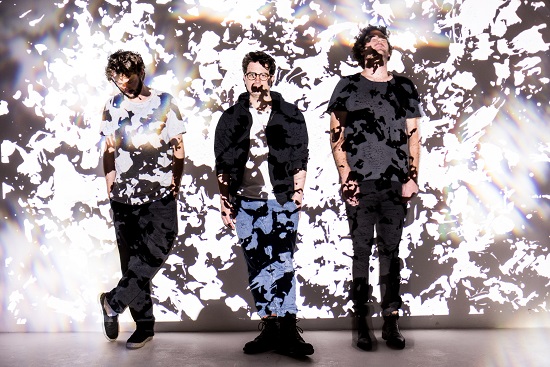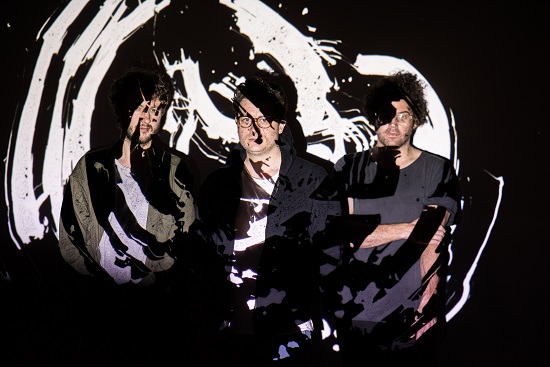All photos by Mike Massaro
"I think we’re a jazz trio more than anything, but on the fringes of what that can mean. The closest thing to our music is spiritual jazz – that’s kind of what we are, maybe," says Luke Abbott. I’ve just asked the members of Szun Waves – Border Community affiliate and Buffalo Temple label boss Abbott on synths, Laurence Pike of Australian experimentalists PVT on drums, and saxophonist Jack Wyllie of London’s Portico Quartet – to define the music they make. It’s probably the most annoying thing I could do, but in this case feels justified as their output sits astride so many things. Over two LPs so far – 2016’s At Sacred Walls and New Hymn To Freedom, out August 31 on The Leaf Label – the trio has seamlessly integrated everything from jazz to psych to ambient to kosmische to experimental electronic music in their ongoing effort to reach a sort of enlightenment through performance.
"I think we all have a genuine aspiration to try and get into a spiritual space when we play," Abbott continues. "Or maybe it’s something about trying to let the music run through you. I remember when I was really young, watching people make music, I had no idea that things were written beforehand. I just thought people were always making up songs in the moment. I’ve always wanted music to be that – something that happens in the moment, just a way of expressing yourself. For me, Szun Waves is a way of trying to do that."
"You bring a lot of your own experience to understanding it," adds Wyllie. "That’s part of the psychedelic side of our music, in that you get different patterns out of the shapes depending on what you bring to it – kind of like a Rorschach test, or a hallucination." And it’s true, New Hymn To Freedom contains deeply synesthetic music, implying color, shape, and form. The night sky is reflected on water, stars throb and pulse, galaxies expand and contract. If, like me, you think James Holden and The Animal Spirits feel satisfyingly rooted in the earth, Szun Waves are a cosmic counterpoint.
Wyllie finishes: "You can kind of shut off part of your brain and let things start to form on their own, which is to attempt something more transcendental."
How did Szun Waves come to be?
Luke Abbott: Laurence had emailed me to see if I wanted to try doing some kind of collaboration at some point. He was into the music I was making, and I’d done a remix for his band PVT. We arranged to meet up at James Holden’s studio next time he was over in London, and I thought that we should record what we were doing just in case anything good came out of it.
Laurence Pike: When I heard the track ‘Amphis’ from Luke’s album Wysing Forest, I was overwhelmed with a feeling that we needed to make some music together. It just made perfect sense to me. I could hear how I could seamlessly work with the way he was thinking about music. The first session we did together was even stranger in that I remember how comfortable it felt from the minute I walked into the room. There was no "getting to know you" period so much, we just got down to the business of making music, as it already felt like we’d been doing it for years.
LA: We did about two days together just working out ways of getting my modular synth setup to work with the drum kit. I suggested getting Jack in for the third day.
Jack Wyllie: Yeah, Luke and I did a weeklong residency in the south of France in 2015 that resulted in [Luke Abbott & Jack Wyllie]. I loved making that EP with Luke, having the chance to improvise tracks together in a style that felt original. I really liked Laurence’s drumming, and it felt like there would be even more depth and creative ideas in the pot. The first recording we made ended up being the first record.
LA: The first track on that album, ‘Further’, was literally the first time we’d played together. There’s something about having captured that moment that I really like.
JW: I think there’s quite a lot of shared references that made it work too, new age and ambient, some ECM Records stuff, psych, spiritual jazz, etc. I also think there was a sense that it was something that we couldn’t do in our existing projects.
LA: We ended up doing a few gigs, and our sound and way of playing together just developed in a really natural way. So, when we came to record this second album, things just felt like they’d come together.

The first record was edited together from something like 16 hours of recordings, right?
LA: Something like that. Most of the tracks on that record are cropped out of long sprawling improvisations – it was kind of hard to work out where the start and end points should be. With the new one we made a conscious effort to keep things shorter.
So, a more focused sort of improvisation?
LA: I suppose this time round we knew we were trying to make a record, whereas the first album we made kind of accidentally.
Luke, I’m wondering what it’s like making improvisatory music like this using modular synthesis? Jack, Laurence, what’s it like improvising around a modular rig?
LA: The modular synth is really only half of the setup for me. There’s a load of synthesis and sound processing that happens in and out of the modular case. I don’t really have to worry about what Jack and Laurence are doing. Jack will tell me if my harmonic structure doesn’t work for him, and Laurence can play to anything. Sometimes he’s clocking a sequencer for me without him knowing, sometimes he’s playing in time with something that’s free running and he thinks he’s clocking it, sometimes I have bass notes locked to his kick drum hits and stuff like that.
It was really useful that Jack and I had developed our ambient record before the Szun Waves thing happened, because we’d already had a chance to explore each other’s tonality.
JW: The bulk of the playing I do isn’t too dissimilar from how I’d play with other instruments. I bounce off a lot of the harmonic cues from Luke and the rhythmic stuff from Laurence. We get into these nice zones where I’m kind of matching the tones of synths and vice versa. I remember there was a point when I took the sax out of my mouth and it was still playing! It turned out to be Luke’s synths kind of disguised as the sound of a saxophone.
LP: There were a couple of moments making the first album where I was completely lost as to who was generating what sounds. At one point, I remember thinking that machines were intuitively responding to and improvising with me. It was an unprecedented experience for me, and kind of unnerving.
LA: A modular synthesiser is really just an open architecture tool, so it comes down to what kind of techniques you’re using. For me, it’s about a kind of meta-playing, where I’m managing these generative situations. Sometimes I’ll pull out a solo on the ribbon controller when I feel a bit Jean-Michel Jarre, but most of the time I’ll be adjusting a set of rules, and the synths are really playing themselves.
LP: Luke is an unusual electronic musician in that he has a deep technical and academic knowledge, but that never inhibits him from giving over to chance, and prioritising scenarios for the music to happen, which I think is a rare combination, particularly when it comes to the cultish, hobbyist world of modular synthesisers.
LA: There’s a lot of thought that’s gone into the technical setup, but it’s not important really. What’s important is giving each other space to play.
For me, a good improvisational recording or performance is all about this feeling that the musicians have tapped into a well of potential that exists between them as a group. How can that happen unless everyone has the space to express themselves as a part of the whole?
LA: Yeah, exactly. I think that’s the thing that makes us a sort of jazz trio. It’s the same basic idea: you find a zone where you can all mess around and try to vibe together.
Can we talk a little bit about the new album’s title, New Hymn To Freedom? I think it colours the record in an interesting way, placing it in the lineage of jazz as protest music and as music that’s striving toward a more enlightened consciousness.
LA: When I was mixing the track ‘New Hymn To Freedom’ it reminded me of the Oscar Peterson Trio track ‘Hymn To Freedom’. There’s a moment in that song where they all start to play just a little bit heavier, and that’s what our track was, just taken a bit further – this building energy – so I called it ‘New Hymn To Freedom’. I’ve always loved that track title. I like how it links what we’re doing to this classic jazz trio record. It’s suggesting that we’re updating that model, but also, the words in that title sum it all up so perfectly. It tells you how sincerely it’s meant calling it a hymn, because the music is a kind of prayer. It’s an assertion of musical freedom, and it mirrors so many sociopolitical ideals, too. Freedom is the most important thing.
When the time came to make this record, did you have any preconceived notions of what you three wanted the record to be?
LA: We just recorded until we had enough. I don’t think we had a plan.
Whenever I begin work on a drawing, I’m not sure I ever really have a plan. Mostly I just work until I hit on something that seems like it should’ve always been there.
LA: Yeah, that’s how I work most of the time, too. Like, you have a feeling and you make something, and then you post-rationalise it. I think you’re probably more free to make work if you don’t have a plan.
JW: I think you need some loose parameters to work in. I think we know very roughly what kind of vibe we’re going for, and then Luke’s set up also dictates some of the harmonic structures. So it’s not totally free in that sense, but I think the parameters we have are very wide, so there’s an enormous amount of potential directions each tune can go in, and the direction is what you trying to work out collectively in the space through the music.
LP: It sounds kind of naive, but a few years ago, before the three of us met, I was listening to some late Coltrane quartet records and wishing that I could play music in a group with that kind of energy and sense of purpose, tapping into that well you were talking about earlier, bringing up the music from the earth the way Coltrane did, but somehow freely and fluidly integrating electronics into that type of headspace and approach.
It kind of occurred to me when I listened back to ‘New Hymn To Freedom’ that we’d come close to achieving something like that ambition, without ever really having consciously considered it since. Not to say we’re on that level yet, obviously, but I feel with our current approach, Szun Waves could aim to ascend to those sorts of mystical heights in the future, which is an exciting prospect.


